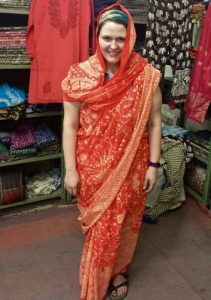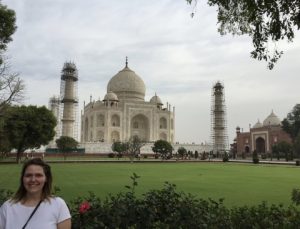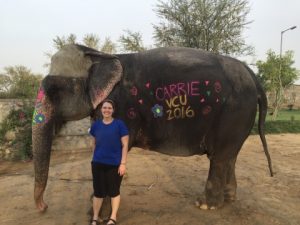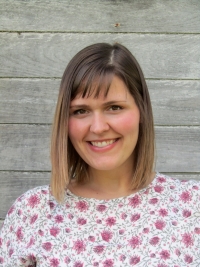Mennonite Health Journal
Articles on the intersection of faith and health
Mennonite Health Journal, Vol. 18, No. 5, August 10, 2016
MHF Student Elective Term (SET) Report
Carrie Schlabach
March 20 – April 28, 2016
U.S. Consulate in Mumbai, India
I glanced at the world clock on my phone. It was 9:48 PM Mumbai time, and I had just arrived, groggy and jetlagged from my 15-hour flight from Newark. To say I was nervous was an understatement. It had been awhile since I was out of the country, and I was very aware that I stuck out here. Even more nerve-wracking, I had never met the person who was supposed to pick me up and had no way of contacting her. With no phone, Internet, or even an address to get to, I thought of the limited options I had if I could not find or identify her. “Why didn’t I ask her for a picture,” I thought to myself anxiously, “or at least get the address to their apartment?” I wandered around outside the airport for what felt like hours, (and in reality was only about 15 minutes). I started to sweat in the 95-degree heat and tried to ignore all the eyes on me. Finally, I saw a woman with “Carrie” written on a piece of paper. I promptly introduced myself and so began my SET experience.
For the longest time, I was uncertain that my Student Elective Term (SET) experience would materialize. My contact person was Lisa Landes, a nurse practitioner in Mumbai, India,. However, she worked for the U.S. Department of State which meant more hurdles to get over in a timely manner. Yet, with plenty of patience and dedication on the parts of Lisa and others at the State Department as well as my school, Virginia Commonwealth University, everything got done in the nick of time. I was fortunate that it worked out after close to one year of emails, security checks, and plenty of paperwork on my behalf. I am truly grateful to all of these people who made this experience possible!
 India was always high on the list of places I wanted to visit. I have always been fascinated with the culture— the way the women dressed in sarees, the attraction of Bollywood films, and, of course, the food. I love Indian food, rich with exotic spices, and drinking masala chai at the end of a meal. What a treat!
India was always high on the list of places I wanted to visit. I have always been fascinated with the culture— the way the women dressed in sarees, the attraction of Bollywood films, and, of course, the food. I love Indian food, rich with exotic spices, and drinking masala chai at the end of a meal. What a treat!
When I found that I could potentially go to India for SET, I jumped at the chance and was very excited to become immersed in the culture. I stayed with Lisa and Dave in Bandra, a suburb of Mumbai, which was a 20-minute drive to the Consulate every day. Most Americans had drivers, including my hosts, because they did not wish to brave the craziness of the Mumbai streets. Traffic there is no joke. There are bikes, mopeds, taxis, rickshaws, cars, and people. Think of any mode of transportation with wheels, and chances are, it could be found on the streets there. In other parts of the country, I also saw donkeys, elephants, and camels participate in this chaos, but not in Mumbai, where I spent the majority of my time.
Many things about this experience made me very aware of my privilege, and having a driver was one of them. Not once previously had I ever been chauffeured around, but in India this was an everyday occurrence. I stayed in an apartment building with my hosts that overlooked the Arabian Sea, as well as a small fishing village. I was keenly aware that I, an American foreigner, had my own private bedroom and bathroom while there were many people nearby without either, essentially living in a slum. All of this made me uncomfortable and aware of the privilege that comes with being a white, American woman. Sometimes I could swallow this feeling down, ignore it, and go about my daily routine, while other days, I had a more difficult time.
Being “the State Department intern” was a unique experience. I enjoyed spending time with the health unit staff and getting to know them better. The clinic itself was slower paced than any of my American clinical sites, and there were not as many barriers to health care, which I enjoyed. I could practice and prescribe the way I wanted without having to worry about what insurance would or would not cover. Patients could typically get the drugs we prescribed at the pharmacy for a relatively low cost, and there were no copays. It was a nice change of pace.
The major drawback was that I did not have Internet access, so it was difficult for me to look up information. Many students in health care use technology to aid them in the diagnoses and management of patients, myself included. Without the use of my phone or the Internet, my resources were limited, and I had to rely more heavily on memory and the few medical texts available in the health unit.
Additionally, I had to consider differential diagnoses reflecting the local epidemiology, with which I was not as familiar. Diagnoses like malaria, dengue fever, or chikungunya were always in the back of our minds. All of these were diseases of which I had limited knowledge and exposure prior to this experience.
 After I finished my month of being the State Department health intern, I was able to travel a bit before returning home to graduate. Being a white female, traveling alone came with its own set of challenges. I had to be very careful of the activities I chose and never would I walk alone at night. I think my dad prayed fervently every day during this time that no harm would come upon me. While I never truly felt unsafe during this time and nothing bad ever happened to me (thank God), I did at times feel uncomfortable. Ultimately, it did not stop me from enjoying the overall experience.
After I finished my month of being the State Department health intern, I was able to travel a bit before returning home to graduate. Being a white female, traveling alone came with its own set of challenges. I had to be very careful of the activities I chose and never would I walk alone at night. I think my dad prayed fervently every day during this time that no harm would come upon me. While I never truly felt unsafe during this time and nothing bad ever happened to me (thank God), I did at times feel uncomfortable. Ultimately, it did not stop me from enjoying the overall experience.
Dave and Lisa decided to go to the Taj Mahal, and graciously invited me along. As it turned out, we just missed the Prince and Duchess of Cambridge on our trip to Agra. They visited the tomb the day before we did, and I enjoyed seeing the many signs welcoming them. I was also able to explore New Delhi and Jaipur, both interesting and vibrant Indian cities.
 Overall, this experience was unique and rewarding. Since returning, many people have asked me if I would go back, and the answer is definitely yes. There are many beautiful parts of India that I did not get the chance to see. Next time, I would prefer to go with someone, as it would make independent travel more enjoyable and make me feel safer overall. Being in India made me more aware of the opportunities I have had that others have not, which is important to recognize as I begin my new journey as a nurse practitioner.
Overall, this experience was unique and rewarding. Since returning, many people have asked me if I would go back, and the answer is definitely yes. There are many beautiful parts of India that I did not get the chance to see. Next time, I would prefer to go with someone, as it would make independent travel more enjoyable and make me feel safer overall. Being in India made me more aware of the opportunities I have had that others have not, which is important to recognize as I begin my new journey as a nurse practitioner.
About the author
 Carrie Schlabach is from Holmes County, Ohio, and is a 2012 graduate of Eastern Mennonite University where she received a Bachelor of Science in Nursing with a minor in Spanish. She is currently living in Richmond, Virginia. She graduated from Virginia Commonwealth University in May 2016 with her Master’s degree. She recently passed her boards and is now certified as a family nurse practitioner. She did her Student Elective Term at a clinic in Mumbai, India during January and February of 2016.
Carrie Schlabach is from Holmes County, Ohio, and is a 2012 graduate of Eastern Mennonite University where she received a Bachelor of Science in Nursing with a minor in Spanish. She is currently living in Richmond, Virginia. She graduated from Virginia Commonwealth University in May 2016 with her Master’s degree. She recently passed her boards and is now certified as a family nurse practitioner. She did her Student Elective Term at a clinic in Mumbai, India during January and February of 2016.
